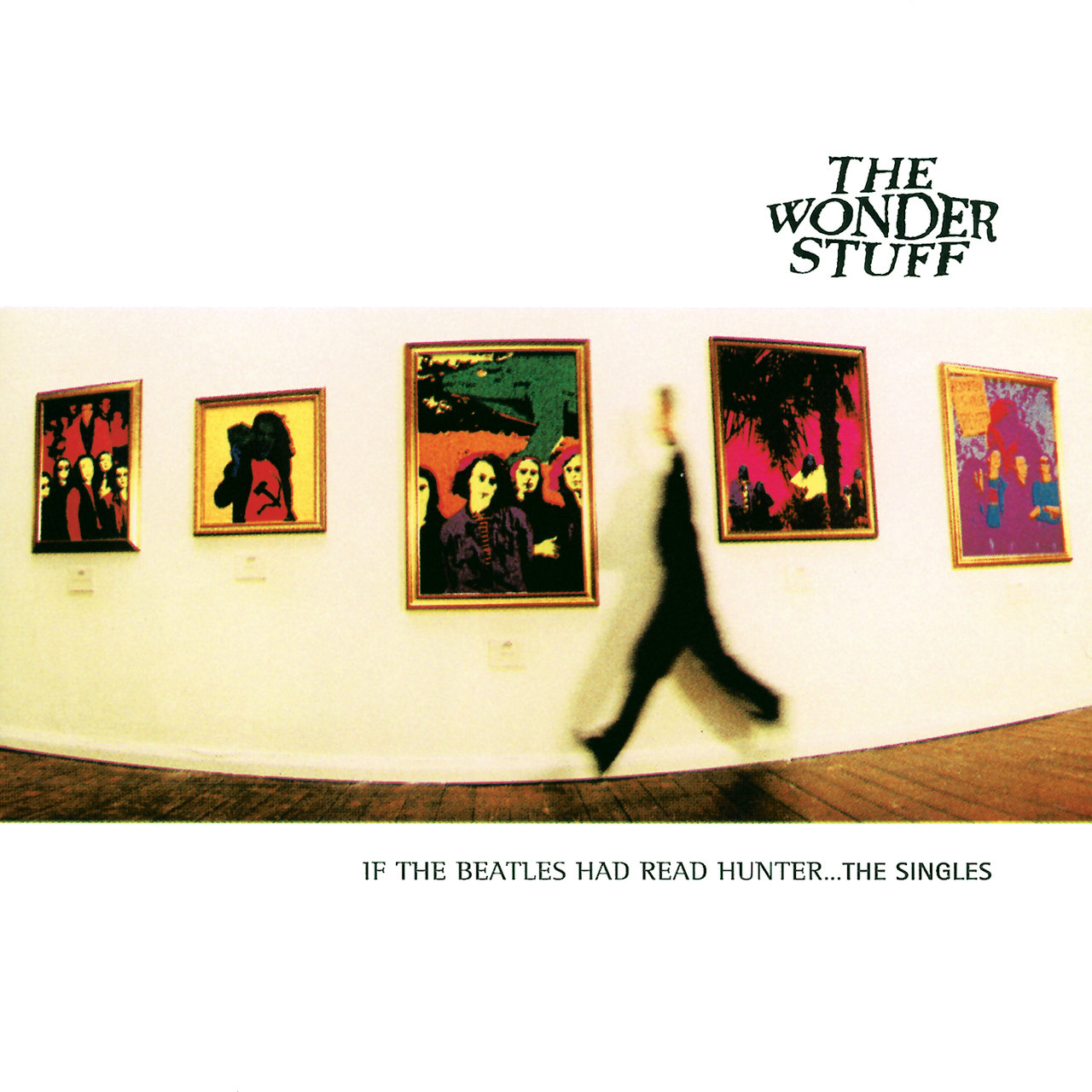It can’t have been easy to have been a former member of The Wonder Stuff in the mid to late 90s, witnessing much watered down variations of their patented guitar-pop sound take an iron-grip on the album and singles charts. If only they could have hung for twelve more months, one more album, one interview with a sympathetic journalist, they might just have been able to reach the level of success that they had so richly deserved. But no. Rancorous relationships with the press, their own record label and each other ensured that, just as The Wonder Stuff’s style of music was becoming unfeasibly popular in the UK, Miles Hunt, Malc Treece, Paul Clifford, Martin Bell, Martin Gilks and Peter Whittaker were waving their last goodbyes from the main stage of the Phoenix Festival, having served as headliners and treated their fans to two hours of three minute pop wonders.
If The Beatles Had Read Hunter… The Singles was, as the name suggests, a compilation of The Wonder Stuff’s singles for Polydor, and was intended to serve as the band’s epitaph. In a little over seven years they had dragged guitar-heavy cynicism-laden pop tunes into something tantalisingly close to the mainstream, and seemingly did so through sheer force of will alone. They weren’t part of a cohesive musical movement that the press could get behind en-masse, and even if they had been, interviews with Miles Hunt could be so stand-offish at times, that the band were swimming against the tide a lot of the time. Perhaps that’s just how The Wonder Stuff wanted it though. After all, a bit of aggro was all part of their sound, every bit as much as their bitter diatribes about failed romances, huge pop choruses, their occasional nod to a distinctly folky influence and a sliver of knowing humour.
Unlike the lesser talents that used a crudely simplified template of their formulae for the rest of the decade, The Stuffies never tried too hard to convince anyone who listened that they were the last word in rock and roll. Instead they were seemingly content to simply be a great pop band, something which, in the grand scheme of things, is a much more difficult art to master. Yet master it they did, and in such a way that tunes like “Give, Give, Give, Me More, More, More”, “Golden Green”, “Circlesquare”, “Welcome to the Cheap Seats” and “Hot Love Now” still stand up as great songs to this day. I mean, are you going to try and argue that “The Size of a Cow” isn’t the equal, if not better, than almost any other guitar-pop song of the 90s?
While If The Beatles Had Read Hunter… is non-chronological, making the gradually increasing sophistication of The Wonder Stuff’s sound more difficult to follow, it makes up for it by being one of the better sequenced compilations on the market, and giving the first time listener the best impression of the band’s ethos throughout their career. That said, it isn’t without a moment where the target is missed somewhat, as the rather neutered re-recording of “Unbearable”, which was released as a single to promote If The Beatles Had Read Hunter, lacks a lot of the fiery abrasiveness of the original version. Elsewhere, while the cover of Slade’s “Coz I Luv You” gives a true indication of where their influences truly lied, veneer of cool be-damned, and their collaboration with Vic Reeves “Dizzy”, resulted in their sole flirtation with chart-topping action, few would argue that these songs were the equal of Stuffies originals.
If The Beatles Had Read Hunter… was perhaps intended as a glorious death-roar. An album length statement that we had had one of the truly great pop bands of their generation ready to spearhead a new guitar music movement, but too many people chose to look the other way to acts that didn’t demand that their fans possessed an iota of common sense. A howl of anguish that despite all the talent needed to be the biggest band in the land for the rest of the decade, The Wonder Stuff were pressed by their unsympathetic record label to crack the American market. The fact that few British acts outside of Radiohead and, errr, Bush, managed to crack the American market in the 90s (and no, regardless of what the Oasis publicity machine churned out at the time, in the grand scheme of things they flopped as big as anyone across the pond), should have resulted in the record executives responsible for so much of the Stuffies disillusion hanging their heads in shame ever since for denying my generation one of the truly great acts of the era.
Still, at least If The Beatles Had Read Hunter… saw The Stuffies go out at the top of their game, and they didn’t return a few years later to be as rancorous and argumentative as they ever were.
Oh. Hang on…














No Comment